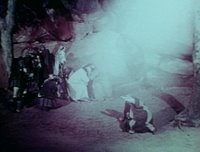 Yesterday I started looking at the Acts if the Apostles series made in 1958 by Broadman films, distributed recently as part of a Living Bible Collection. We now come to episodes 3 and 4 which I have already made some comments about in my Galatians vs. Acts post.
Yesterday I started looking at the Acts if the Apostles series made in 1958 by Broadman films, distributed recently as part of a Living Bible Collection. We now come to episodes 3 and 4 which I have already made some comments about in my Galatians vs. Acts post.Acts: Episode 3 - Light From Heaven
1 Tim 1:15 cited
Stoning of Stephen - (Acts 7:54-8:1)
Saul Persecutes the church - (Acts 8:2-3)
Road to Damascus - (9:1-9*)
God speaks to Ananias - (Acts 9:10-16)
Paul is healed - (Acts 9:17-19)
1 Tim 1:15-17 cited
 *This story is actually narrated three times in Acts, in chapter nine as part of the story, and in chapters 22 and 26 as narrated by Paul in two of his speeches. There are slight variations in these three tellings. In Acts 9 a light from heaven flashes around him, Paul falls to the ground and he hears a voice from heaven. The men with him hear the voice but cannot see anyone. Obviously, Paul later claims in his epistles that he did see Jesus. The account in Acts 22 is fairly similar. But in Acts 26, Paul and his men all fall to the ground and the words of Jesus are more extensive. The film combines these accounts, some of his followers drop to their knees, others remain standing, they cower from the light, such that they do not actually see Jesus, and no comment is made about what they actually hear. Finally Jesus's words reflect both those of chapters 9/22 and chapter 26.
*This story is actually narrated three times in Acts, in chapter nine as part of the story, and in chapters 22 and 26 as narrated by Paul in two of his speeches. There are slight variations in these three tellings. In Acts 9 a light from heaven flashes around him, Paul falls to the ground and he hears a voice from heaven. The men with him hear the voice but cannot see anyone. Obviously, Paul later claims in his epistles that he did see Jesus. The account in Acts 22 is fairly similar. But in Acts 26, Paul and his men all fall to the ground and the words of Jesus are more extensive. The film combines these accounts, some of his followers drop to their knees, others remain standing, they cower from the light, such that they do not actually see Jesus, and no comment is made about what they actually hear. Finally Jesus's words reflect both those of chapters 9/22 and chapter 26.Due to the production's low budget we don't see Jesus either. There is no shot from Paul's point of view unlike, say Paul the Emissary, we only see the light shining on him. In contrast, when Paul is healed by Ananias, we do experience Paul regaining his sight from his point of view. This shot is very reminiscent of the first shot of Jesus we experience in Cecil B. DeMille's The King of Kings (1927).
It's also interesting that Paul's conversion is summed up at the end of the film as follows:
At long last he could know from personal experience the forgiveness of sin, and the meaning of salvation which comes through faith and an acceptance of ChristThis is very much pre- the new perspective of Paul ushered in by Sanders, and it has a very Reformed Church understanding of the differences between Judaism and Christianity.
 Two, quick, final points. Firstly, the Stoning of Stephen is shown in greater detail here than in the previous episode. The series quite often re-cycles previous / extraneous material through flashbacks etc. Secondly, it is very noticeable here that "Jesus" speaks in King James version language, as opposed to the more every day language of the rest of the cast and the narrator.
Two, quick, final points. Firstly, the Stoning of Stephen is shown in greater detail here than in the previous episode. The series quite often re-cycles previous / extraneous material through flashbacks etc. Secondly, it is very noticeable here that "Jesus" speaks in King James version language, as opposed to the more every day language of the rest of the cast and the narrator.Acts: Episode 4 - No Respecter of Persons
[Introduction]
Cornelius hears from God - (Acts 10:1-8)
Peter’s vision - (Acts 10:9-20)
Peter at the house of Cornelius - (Acts 10:21-48)
Peter Explains his Actions - (Acts 11:1-18)
Romans 10:12-13 cited
 The introduction here paints a fairly broad context for this episode. "Gentiles who wanted to worship the true God of the Hebrew religion were tolerated in the synagogue, but hardly welcomed. A great gulf of pride and prejudice separated these gentile outsiders from the fellowship accorded to the Jewish race." (It's interesting given our society's obsession with "tolerance" how the word is played in it's original, and slightly negative light here. Technically, tolerance implies "putting up with". Interestingly the film mentions "pride and prejudice", a phrase that really became common currency after Jane Austen's novel where being described as "tolerable" is seen as an insult). I'm not sure how correct this opening quote really is, however.
The introduction here paints a fairly broad context for this episode. "Gentiles who wanted to worship the true God of the Hebrew religion were tolerated in the synagogue, but hardly welcomed. A great gulf of pride and prejudice separated these gentile outsiders from the fellowship accorded to the Jewish race." (It's interesting given our society's obsession with "tolerance" how the word is played in it's original, and slightly negative light here. Technically, tolerance implies "putting up with". Interestingly the film mentions "pride and prejudice", a phrase that really became common currency after Jane Austen's novel where being described as "tolerable" is seen as an insult). I'm not sure how correct this opening quote really is, however.An interesting comparison is made between Jonah and Peter on basis of their temporary residences in Joppa, and their wrestling with God's instructions. The film doesn't stress that both men are troubled by God's commands because they relate to Gentiles, but it's not hard for anyone who knows the two stories to make this extra jump.
 The film is quite bold in its depiction of Peter's report back to the church in Acts 11. The narrator actually says that "some of the early church were guilty of racial prejudice" hence their attitude to the gentiles. This is quite a strong statement, but, it would be surprising if this was not amongst the motive of some of those that objected to gentiles entering the church. The church is the community of people who are being redeemed, and hence has always contained people with sinful attitudes in their lives.
The film is quite bold in its depiction of Peter's report back to the church in Acts 11. The narrator actually says that "some of the early church were guilty of racial prejudice" hence their attitude to the gentiles. This is quite a strong statement, but, it would be surprising if this was not amongst the motive of some of those that objected to gentiles entering the church. The church is the community of people who are being redeemed, and hence has always contained people with sinful attitudes in their lives.
No comments:
Post a Comment
Spammers - don't bother! Anything perceived as spam will be deleted. Save us both a bit of time and go somewhere else.